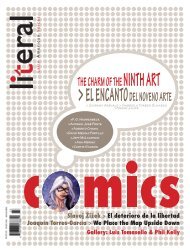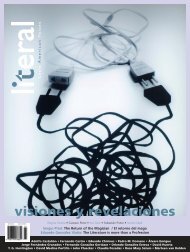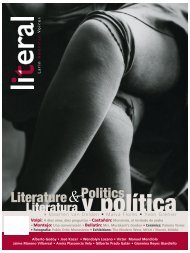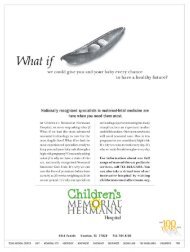Richard Serra - Literal
Richard Serra - Literal
Richard Serra - Literal
You also want an ePaper? Increase the reach of your titles
YUMPU automatically turns print PDFs into web optimized ePapers that Google loves.
wLama Temple in Beijin<br />
before my speech, one minister introduced me and<br />
described me as a good Christian. I don’t know if he<br />
knew that my fundamental belief is that there is no<br />
god, but I’m alright with that. I said OK I’m happy, I feel<br />
a great honor. Muslims consider me a good Muslim.<br />
Theistic religions have their own beauties, very powerful<br />
concepts that facilitate these good qualities. Non<br />
theistic religions also have their respective beauty.<br />
So diversity in 6 billion human beings is natural and<br />
inevitable. Even within twins there are some physical<br />
and behavioral similarities, but if you go further beyond<br />
this observable level of similarities to the genetic<br />
levels you’ll see the level of discrepancies. So having<br />
more than 6 billion humans all living in different locations,<br />
with huge differences between climate, there is<br />
a need for a different way of approaching life to cultivate<br />
the goodness in human beings: love, compassion<br />
forgiveness, tolerance, contentment, self discipline.<br />
That’s more important than each individual approach.<br />
From a wider context we’re human beings and all have<br />
the same potential for the betterment of society. So I<br />
think diversity, if utilized properly, will be an important<br />
factor to develop a common effort. It’s like a good garden.<br />
One garden can be properly planted. One fl ower<br />
may not be so beautiful by itself, but if we see different<br />
fl owers with different sizes and colors, then it looks<br />
very attractive. Within the face there are dissimilarities,<br />
even in the eyes, the more color, the more differences,<br />
the more attractive the eye is. So in humanity as a<br />
whole, I think diversity of culture, of religion of races is<br />
6 4 L ITERAL. LATIN AMERICAN VOICES • FALL, 2007<br />
more beautiful. I think it’s a fact whether we like it or<br />
not. Whether we like it or not there are Buddhists, Hindus,<br />
Christians, Jews, Muslims and so on. Neither one<br />
have the ability to convert to or to eliminate the other.<br />
These religions, I believe, have been in existence for<br />
the last 1000 to 3000 years. In the twenty fi rst century,<br />
even if you try to utilize all the best means to eliminate<br />
all the races, religions, etc, is impossible. Eventually, I<br />
think we’ll use a single language, and I fully support it.<br />
So let’s not worry about the preservation of the Tibetan<br />
language. If 6 billion people prefer it otherwise. Still,<br />
even with this new language, I believe the diversity of<br />
cultures and of religion will remain, and this shouldn’t<br />
be an obstacle to the global family.<br />
One thing I want to share with you is the concept<br />
of one religion and several religions. This is contradictory.<br />
According to one, faith is considered the only<br />
creed. This idea is very common. Generally inherent in<br />
most religions is the belief in the notion of singleness<br />
of truth with respect to one’s own tradition. So that<br />
concept for individual practitioners is relevant and important<br />
in order to have unshakeable faith. One truth<br />
is important. Several religions are already here, and<br />
these, I think, give immense inspiration to the people<br />
of the present past and future. The question is how to<br />
reconcile these differences of truth. In terms of the individual,<br />
the concept of one truth is relevant. In terms<br />
of a group or community, then the concept of several<br />
truths is relevant. So if you are related to these different<br />
perspectives and concepts, one in the contexts of<br />
the individual practitioners and one in the context of<br />
the society and multiplicity of individuals, then there<br />
are not contradictions between the two.<br />
Then there’s the question of what is the “best”<br />
faith and here again, if you look at the question carefully<br />
this question can’t be answered independently<br />
from the individual’s well being in relation to each person.<br />
So, like in medicine, we cannot say which the best<br />
is. “Best” is according to each illness, so to a person<br />
who has a certain mental disposition, this religion is the<br />
perfect one. Now, for example, according to my own<br />
mental disposition the Buddhist approach is the most<br />
suitable and effective, so for me Buddhism is best. That<br />
doesn’t give me the right to tell my Christian, Muslim,<br />
Jewish, Taoist and Hindu brothers that, since Buddhism<br />
suits me, it’s the one for them. Everything will depend<br />
upon individual disposition or taste. Once we accept<br />
differences and the potential greatness of each creed,<br />
religious tolerance will automatically come.<br />
This conference was presented on May 1, 2007 at<br />
Rice. It was organized by The Boniuk Center for Religious<br />
Tolerance and the Offi ce of the President; both at<br />
Rice University www. boniukcenter.org






